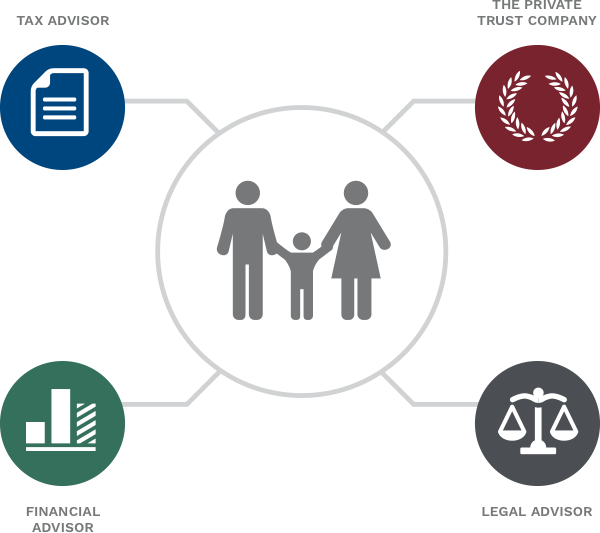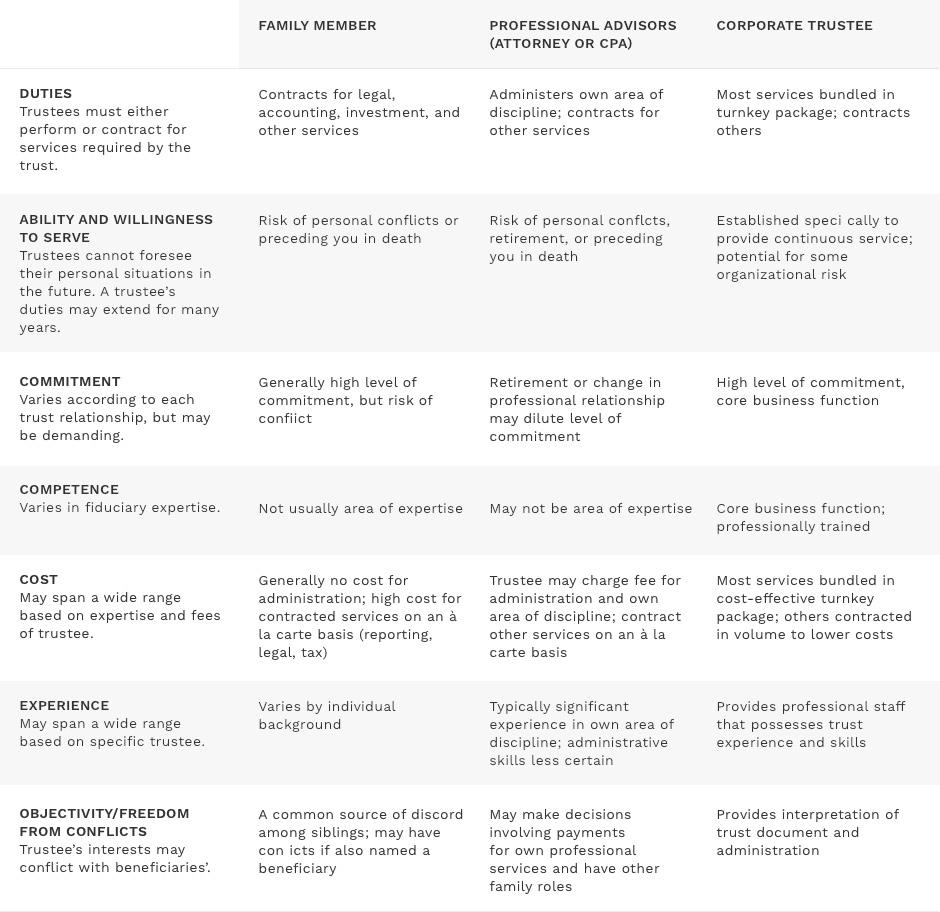
PLANNING
Estate Planning
OUR OFFICE
ARTAAD Financial
128 Tommy Stalnaker Drive
Suite 300
Warner Robins, GA 31088
PHONE 478-333-3790
FAX 478-333-5043
By definition, estate planning is a process designed to help you manage and preserve your assets while you are alive, and to conserve and control their distribution after your death according to your goals and objectives. But what estate planning means to you specifically depends on who you are. Your age, health, wealth, lifestyle, life stage, goals, and many other factors determine your particular estate planning needs. For example, you may have a small estate and may be concerned only that certain people receive particular things. A simple will is probably all you'll need. Or, you may have a large estate, and minimizing any potential estate tax impact is your foremost goal. Here, you'll need to use more sophisticated techniques in your estate plan, such as a trust.
To help you understand what estate planning means to you, the following sections address some estate planning needs that are common among some very broad groups of individuals. Think of these suggestions as simply a point in the right direction, and then seek professional advice to implement the right plan for you.
POINTS TO CONSIDER
Since incapacity can strike anyone at anytime, all adults over 18 should consider having:
- A durable power of attorney: This document lets you name someone to manage your property for you in case you become incapacitated and cannot do so.
- An advance medical directive: The three main types of advance medical directives are (1) a living will, (2) a durable power of attorney for health care (also known as a health-care proxy), and (3) a Do Not Resuscitate order. Be aware that not all states allow each kind of medical directive, so make sure you execute one that will be effective for you.
If you're young and single, you may not need much estate planning. But if you have some material possessions, you should at least write a will. If you don't, the wealth you leave behind if you die will likely go to your parents, and that might not be what you would want. A will lets you leave your possessions to anyone you choose (e.g., your significant other, siblings, other relatives, or favorite charity).

Planning With Confidence
What is a Trust?
A trust is your instructions for the management of all or part of your property. An attorney who represents you and has expertise in the area of estate planning should create your trust.
The trust document describes:
- How you want your assets managed and eventually distributed
- Who you want to benefit from your assets now and in the future
- Who you want to be responsible for carrying out these instructions
WHAT CAN A TRUST DO FOR YOU?
A trust can provide a measure of comfort, knowing you have a plan in place to help provide for the safe and accountable management of family assets and to direct their use in accordance with your wishes, goals, and objectives.
A trust is used to help ensure the proper management of your assets throughout the different stages of your life:
- During your lifetime, placing assets in a trust allows you the freedom to continue managing your assets or to devote time to other priorities while ensuring the avoidance of probate and providing privacy. A trust created and funded during your life is generally called a “living” or “revocable” trust.
- In the event you’re incapacitated, a trust can help ensure your needs are met and your finances are kept in good order for your benefit.
- Upon your death, a trust becomes “irrevocable,” and your assets are managed and distributed by your trustee, in accordance with your instructions throughout the trust’s existence.
- An estate planning attorney may recommend creating an irrevocable trust during your lifetime, in addition to a revocable trust. This may provide creditor protection, controlled giving to family members, or estate tax minimization.

A TRUST CAN HELP
- Provide an orderly means of administering your personal and financial affairs should you become incapacitated, or upon death.
- Ensure your assets are managed for the benefit of your heirs, according to your wishes.
- Manage your estate tax exposure and avoid probate costs.
- Provide for a relative or disabled child after your death.
- Protect assets from a creditor's claims.
- Assemble a tax-advantaged charitable gift.
The Benefits of a Trust
A trust provides protection for family members who may be unaccustomed to dealing with financial matters. It can offer protection of assets in case of divorce or other litigation. A trust can assure funding is available for specific needs, such as education, healthcare, or charitable interests. A trust provides a framework in which money is managed in a predictable fashion, by people you choose, according to standards you set. A trust creates guidelines for current and future distributions that reflect your wishes.
A trust may also have substantial tax benefits and provide an expedient method to transfer assets.
How does a trust work?
There are two basic types of trusts. Revocable or living trusts are the foundation of many clients’ estate plans. An irrevocable trust is used for many specific transfer and tax benefits and to handle assets after you’ve passed away.
REVOCABLE OR LIVING TRUST
A revocable or living trust is a trust you can change or cancel during your lifetime. You control a revocable trust, and the trust’s earnings are consolidated into your income tax returns. You may continue to manage the assets, or your financial advisor will manage your assets under your supervision and upon your disability.
Similar to a will, a revocable trust can also be used to transfer assets at death, yet without the formal, court-supervised process of probate. In many states, the probate process is slow and expensive, and also opens your estate to public scrutiny. Once you pass away, your wishes are nal and thus the trust becomes irrevocable.
IRREVOCABLE TRUST
An irrevocable trust is a trust that cannot be changed or cancelled at any time. It’s a separate legal entity and its own taxpayer. The terms of many irrevocable trusts, however, allow tremendous flexibility. While many irrevocable trusts come into being at death, irrevocable trusts set up before death are often used to hold life insurance policies, gifts of assets to be made available to beneficiaries at a future time, or funds for future charitable contributions. To achieve beneficial tax results, many irrevocable trusts are written to follow patterns based on the rules in the Internal Revenue Code. The structure most suited to your needs can best be determined with the help of financial, legal, and tax advisors who specialize in these fields.

THE PRIVATE TRUST COMPANY OFFERS ADMINISTRATIVE SERVICES FOR THE FOLLOWING TYPES OF ACCOUNTS:
- Revocable or living trusts
- Irrevocable trusts
- Charitable remainder trusts
- Charitable lead trusts
- Special needs trusts
- Life insurance trusts
- Trusteed IRAs
- Agency
- Custodial and escrow
- Private foundations
- Guardianships
- Family office group
A Variety of Trusts to Meet Your Needs
Different kinds of trusts are designed to meet different objectives. For example, if your goal is to ensure privacy in the settlement of your estate, to centralize control of assets, or to take full advantage of estate tax credits provided by the IRS, you might choose a living or revocable trust.
LIVING TRUST
A living or revocable trust allows you to remain both the trustee and the beneficiary of the trust while you’re alive. You maintain control of the assets and receive all income and benefits. Upon your death, a designated successor trustee manages and/or distributes the remaining assets according to the terms set in the trust, avoiding the probate process. In addition, should you become incapacitated during the term of the trust, your successor or co-trustee can take over its management.
SPECIAL NEEDS TRUST
A special needs trust is typically designed to benefit a disabled individual. Instead of giving assets directly to the beneficiary, assets are transferred to a special needs trust by family members or as damages paid because of a lawsuit, and those assets are available for the beneficiary without disqualifying him or her from government programs, such as Social Security income and Medicaid. A special needs trust provides for supplemental care which consists of items over and above necessities like housing, food, and clothing—and benefits the government provides.
SURVIVOR'S TRUST
A survivor's trust is a trust created by an individual during life, and becomes irrevocable (cannot be changed) after his or her death, to provide for a surviving spouse, domestic partner, or other loved one(s). “Survivor’s trust” is a general term for a variety of common trusts, including trusts referred to as an A trust, marital trust, B trust, family trust, bypass trust, or credit shelter trust, among others. No matter what the type of trust, tax provisions, or family situation, individuals naming The Private Trust Company, N.A. (PTC) to serve as trustee of their survivor’s trust can take comfort in knowing it will administer their survivor's trust for the benefit of loved ones competently, according to their wishes, and in the best interest of the significant others they leave behind.
CHARITABLE LEAD TRUST
To help benefit your favorite charity while serving your own trust purposes, you might consider a charitable lead trust (CLT). This trust lets you pay a stream of income to a charity from a particular asset for a designated amount of time, after which the principal goes to the beneficiaries, who can receive the property free of estate taxes.*

ALL TRUSTS, REVOCABLE AND IRREVOCABLE, HAVE THREE PARTIES INVOLVED:
- The person who creates the trust (grantor)
- The person or firm that is responsible for the trust (trustee)
- The people or charities that benefit from the trust (beneficiaries)
It's important to consider who you want to manage your assets and who will benefit from the trust, both now and in the future.
CHARITABLE REMAINDER TRUST
Another charitable option, the charitable remainder trust (CRT), allows you to receive a stream of income and a tax deduction at the same time, and ultimately leave assets to a charity. Through this trust, the trustee will sell the donated property or assets, tax deferred, and establish an annuity payable to you, your spouse, or your heirs for a designated period of time. Upon completion of that time period, the remaining assets go directly to the charity. Highly appreciated assets are typically the funding vehicles of choice for a CRT.*
GENERATION-SKIPPING TRUST
If you want to leave money to your grandchildren, you might consider a generation-skipping trust. This trust can help preserve your generation- skipping transfer tax exemption on bequests to your grandchildren and avoid the tax on bequests exceeding that amount, which can be up to 45%.
IRREVOCABLE LIFE INSURANCE TRUST
An irrevocable life insurance trust (ILIT) is often used as an estate tax-funding mechanism. Under this trust, you make gifts to an irrevocable trust, which in turn uses those gifts to purchase a life insurance policy on you. Upon your death, the policy’s death benefit proceeds are payable to the trust, which in turn provides cash to help beneficiaries meet estate tax obligations.*
TRUSTEED IRA
Also known as an individual retirement trust, a trusteed IRA is a trust account that provides preservation and control of your IRA assets. It allows you to combine your estate planning and retirement goals within a single framework.
*Please consult your attorney or tax advisor for income and gift tax consequences.
OUR FOCUS IS ON BUILDING RELATIONSHIPS
We know this requires more than deep knowledge, experience, talent, and education. It requires dedication to providing consistently high-quality service at every level of our operations and administration, and a steadfast commitment to excellence and our governing principles:
- Honesty
- Integrity
- Objectivity
- Transparency
- Personal responsibility
Roles of Your Professional Advisors
Your financial advisor’s role is to support everyone, not to replace anyone. Your financial advisor will work with you and your tax and legal advisors, helping to coordinate and communicate your complete financial picture. The drafting of your trust document will be done by your estate planning attorney. PTC is available to administer your trust once it’s properly drafted. You can continue to benefit from the judgment of your trusted financial advisor, while your family’s wealth is protected by a knowledgeable trustee.

The Trustee: A CEO for Your Estate
The trustee's role is to administer and distribute the assets in the trust according to your wishes, as expressed in the trust document. There are three primary elements to the trustee’s role:
CUSTODY OF ASSETS
The custodial role is that of a financial secretary and security guard. The trustee must identify and then take title to the trust’s assets, keep accurate records, report to the current beneficiaries, execute and settle all transactions, protect and insure the property, and defend the trust against claimants. The trustee oversees the preparation of appropriate tax returns and all of the trust accounting in compliance with complex state and federal laws.
ASSET MANAGEMENT
The trustee is ultimately responsible for the preservation and investment of assets in the trust, ensuring that invested assets are productive and managed appropriately given the trust's objectives. The trustee has the legal responsibility to reassess the objectives of the trust and current market conditions at least annually, and to be sure that the investments match those objectives. Trustees will often hire professional managers to handle day-to-day specialized activities, such as real estate management. The day-to-day investment management is delegated to your trusted financial advisor.
ADMINISTRATION
The administrative role is central to carrying out your wishes regarding the use of assets in the trust. The trustee carries out your directions and follows your guidelines in handling the specific circumstances of each request for funds from trust bene ciaries. This involves legal interpretation of the language in the document and appropriate input from family members. Experienced trust administration and recordkeeping are vital components to implementing your plan. The day-to-day relationship management is also handled by your trusted financial advisor.
Why Use a Professional Trustee?
Trustees may have to make tough decisions that might not be popular with all your beneficiaries. After all, the trustee is carrying out your instructions, not your beneficiaries’ wishes. This can be a difficult role to fulfill for a family member, who may not be unbiased or may wish to act in a manner that avoids hard feelings within the family, rather than carrying out your instructions. Also, few family members have investment management skills or expertise in fiduciary law and practice. Family members can be given important advisory roles, such as in approving disbursements or other exercises of discretion.
ADMINISTRATION
- Loyalty and independence to carry out your wishes
- Knowledgeable management, protection, and defense of trust assets
- Experienced oversight of the investment process to be carried out by your financial advisor
- Timely and accurate statements of the account to keep you and all current beneficiaries informed
- Consistent annual reviews
- Accountable collection and prudent distribution of income and assets
- Tax reporting, filing, and comprehensive regulatory compliance on behalf of the trust
Why Use PTC?
PTC partners with you and the professional advisors you rely upon to assist you in carrying out your wealth management and legacy planning goals at every stage of your life. While your financial advisor generally cannot serve as your trustee, with our unique model, your financial advisor can continue to provide advice and manage trust assets, allowing you to benefit from checks and balances and a consistent approach across your wealth management and investment strategies.
ADVANTAGES OF CHOOSING PTC:
- PTC offers maximum flexibility, working with clients and their financial advisors. Choose to work exclusively with your financial advisor, or work collaboratively with the full expertise of the PTC team.
- Integrating seamlessly into your wealth management team, PTC keeps the process of delivering key communication and statements running smoothly between clients and professional advisors.
- PTC helps clients develop written investment policy statements so all parties have a clear and consistent understanding of goals, objectives, and guidelines for the trust.
- PTC reviews accounts regularly and revising investment policies to reflect changes to the portfolio, client circumstances, and financial markets.
- Experienced and knowledgeable trust officers bring backgrounds in law, accounting, banking, investment management, tax, and business.
- Trust officers are friendly, discreet, and sensitive to family dynamics.
- A team of trust officers and trust specialists are available to you and your financial advisor when you need them.
- Chartered as a national bank, PTC is devoted solely to trust services for families.
- PTC provides trust services in all 50 states.
- As a subsidiary of LPL Financial Holdings, Inc., we are backed by substantial resources and a long-term commitment to independent financial advisors and their clients.

Services Offered
 Trusts are not simply one aspect of our business. They’re our sole business. We don’t try to be all things to all people. We have one area of expertise: helping families implement their estate plans and carry out your financial wishes. We do this in a unique way—by engaging the team of advisors with whom you already have relationships.
Trusts are not simply one aspect of our business. They’re our sole business. We don’t try to be all things to all people. We have one area of expertise: helping families implement their estate plans and carry out your financial wishes. We do this in a unique way—by engaging the team of advisors with whom you already have relationships.
PTC serves in an administrative corporate trustee role and makes sure that trusts are managed and distributions occur according to the terms of the trust document. PTC also serves in an administrative corporate trustee role for all recordkeeping, accounting, and tax preparation services for trusts.
PTC does not provide day-to-day investment management for trust assets. Instead, we enable clients to maintain their relationship with their fiadvisors for investment management.
TRUST ADMINISTRATION: SERVING AS TRUSTEE OR CO-TRUSTEE
The trust administration role is central to carrying out your wishes regarding the use of assets in the trust. The trustee carries out your directions and follows your guidelines in handling the specific circumstances of each request for funds from trust beneficiaries. This involves legal interpretation of the language in the document and appropriate input from family members, as well as conformance with appropriate and applicable state trust codes. Experienced trust administration is a vital component of implementing your plan.
TRUST SETTLEMENT SERVICES
Trust settlement is the process of settling an estate through a trust, either in addition to or rather than a will. Your nancial advisor will lead you through the process with the expertise of PTC. We are committed to delivering administrative trust services in a seamless manner—helping you maintain and strengthen your financial picture and transfer assets at death to the ones that mean the most.
 AGENT FOR INDIVIDUAL TRUSTEE
AGENT FOR INDIVIDUAL TRUSTEE
Individual trustees can retain complete control over a trust and simply outsource many administrative duties to PTC. It’s often viewed as an honor to serve as trustee of a trust established by a loved one or friend. However, quite often the administrative duties can be time consuming, overwhelming, or burdensome. PTC can assist an individual trustee by serving as agent for trustee. With the trustee maintaining complete control over investment management and discretionary distribution responsibilities, we can provide review of the trust agreement and assets, trust accounting, distribution activity, transaction reporting, investment monitoring, and tax services (including the preparation of appropriate tax returns and all of the trust administration in compliance with complex state and federal laws). We also provide any required accountings to be filed with local courts, regular maintenance and execution of scheduled or recurring payments as authorized or directed, and assistance with the proper determination of income or principal characteristics for transactions paid as stipulated in the trust agreement or state law.
FAMILY OFFICES
PTC brings a high-caliber and experienced team, providing customized “family office” and wealth solutions for the specialized needs of high-net-worth and ultra-high-net-worth families, privately held and family businesses, and family foundations. In addition to our traditional trust administration and oversight of investment management, PTC’s family office services assist families by assuming much of the day-to-day management of a family’s affairs, including discussing your tax, estate, and philanthropic planning, bill paying, family member financial education, and family governance.
CUSTODY AND ESCROW SERVICES
The custodial role is that of a financial secretary and security guard. PTC identifies and takes title to the trust’s assets, keeps accurate records, reports to the current beneficiaries, and executes and settles all transactions.
Comparing Trustee Choices
Your choices of a trustee or successor trustee may include a family member or friend, a professional advisor such as an attorney or CPA, or a corporate trustee. Each choice offers speci c advantages and disadvantages. It may be helpful for you to consider these choices in the context of the duties of the trustee and the desired qualities outlined below.

How Do I Get Started?
Increasing numbers of Americans are discovering the potential benefits of a trust—how it can help protect their assets, reduce their tax obligations, and de ne the management of assets according to their wishes in a private, effective way. Your financial or legal advisor can help you evaluate a certain type of trust to determine if it may be appropriate for your circumstances.
- Discuss your goals with your financial advisor, who can help determine whether a trust may be right for you.
- Have the trust document drafted by your attorney, incorporating sample language PTC provides to ensure flexibility in using your choice of financial and family advisors to the trustee.
- Name PTC as trustee or successor to the trustee.
- Work with your financial advisor to set up a trust account and transfer appropriate assets into it.
- Enjoy the comfort of knowing your wishes will be carried out.
For additional information and questions, please visit us at www.theprivatetrustcompany.com.

